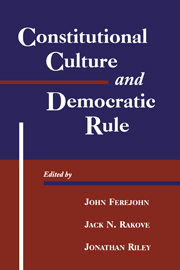Editors' Introduction
Published online by Cambridge University Press: 20 March 2010
Summary
Martin Diamond, the late political theorist, closed a famous essay by reflecting on the “profound distinction” that the essays of The Federalist “made between the qualities necessary for Founders and the qualities necessary for the men who come after” (1992, 35). Whereas the act of founding the American constitutional republic had demanded an exceptional exercise in reason, he observed, the conduct of politics thereafter would depend on nothing more exalted than the ordinary play of interest. Diamond's distinction nicely captures the idealized image of constitution making that many scholars still intuitively, and perhaps even uncritically, share. In this view, considerations of stability and justice alike should encourage constitution makers to transcend the particular interests they represent. If they cannot be expected to step behind a Rawlsian veil of ignorance, where they will be uninformed of the social position they will occupy in the new regime, they should at least recall (to borrow a phrase from John Marshall) that it is a constitution they are drafting, not some ordinary piece of legislation. The establishment of a successful constitutional regime thus demands substantial self-restraint; its authors have to expect more of themselves than they do of their successors, the “posterity” for whose benefit framers, in the heroic account, struggle.
A satisfactory political theory of constitutionalism can well agree, with Diamond, on the importance of the initial deliberative processes through which a constitution is adopted. But such a theory can hardly stop there. It also calls for a satisfactory interpretation of constitutional history.
- Type
- Chapter
- Information
- Constitutional Culture and Democratic Rule , pp. 1 - 38Publisher: Cambridge University PressPrint publication year: 2001



